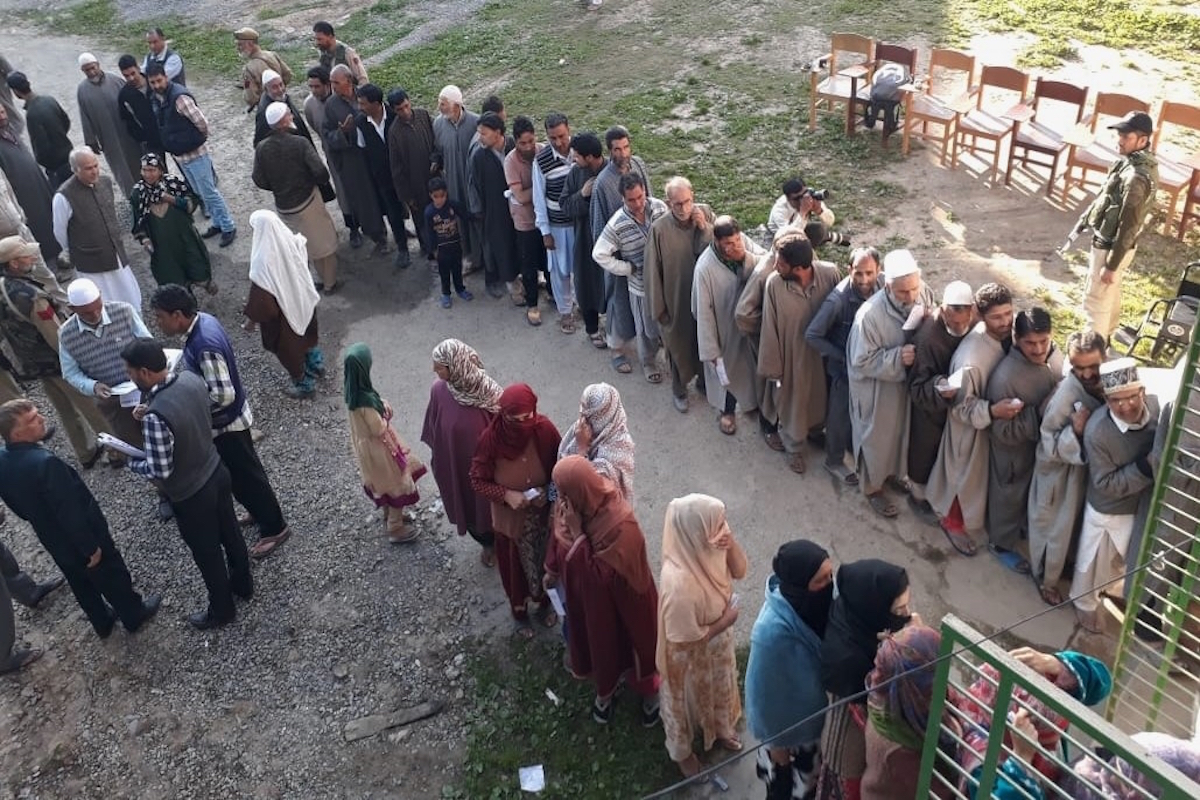As Budget session resumes,language row and delimitation dominate proceedings
The first part of the Budget session drew to a close on February 13.
Political parties in Jammu and Kashmir are interpreting the high polling percentage of the Lok Sabha election in their own ways as the 35-year record has been broken with an upswing of 58.11% voting in the five constituencies where the election concluded in phases on Saturday.

Voters queue up at a polling station to cast their votes (Photo: IANS)
Political parties in Jammu and Kashmir are interpreting the high polling percentage of the Lok Sabha election in their own ways as the 35-year record has been broken with an upswing of 58.11% voting in the five constituencies where the election concluded in phases on Saturday.
J&K had been witnessing low polling since 1989 when terrorism broke out and the Pakistan-backed terrorists and separatists made it a routine to call for poll boycott, particularly in the Kashmir valley. However, their boycott calls were generally not accepted in the Jammu region.
Advertisement
The authorities skipped the elections in J&K in 1991 because of the turmoil created by terrorists.
Advertisement
It’s noteworthy that after many elections not a single polling booth in Kashmir has reported zero voting.
The last highest voter turnout in J&K was 49.58% in 2014. The lowest polling of 29.93% was witnessed in 1989.
Anantnag, which has been the epicentre of terrorism, on Saturday recorded 53% polling against 8.96% in 2019.
During the peak of terrorism, the gunmen would dare people in Kashmir to defy their poll boycott call and get rewarded. However, during this election, the kin of top terrorist commanders were seen in serpentine queues, waiting for their turn to cast their vote in the Shopian and Anantnag districts of South Kashmir.
Hizbul Mujahideen terrorist Junaid Reshi’s father Mushtaq Ahmad Reshi reportedly voted at a polling booth in Beminapora in Shopian.
A former separatist, Mukhtar Waza, was also seen casting his vote.
Since the eruption of terrorism in Jammu and Kashmir, the highest-ever poll percentage in the Anantnag Parliamentary Constituency was recorded in 1996 at 50.02%. Hence, the poll percentage of 53% this time is the highest in the last 35 years, said Chief Electoral Officer Pandurang K Pole.
This election was conducted without any boycott calls or intimidation, exhibiting voters’ unwavering belief in the power of the ballot.
The failure of the INDIA bloc to reach any seat-sharing agreement in J&K resulted in the National Conference (NC) and PDP contesting the election against each other. The Congress supported Omar Abdullah and two other NC candidates in the three seats of the valley.
However, the NC and PDP supported Congress candidates in contesting against the BJP in the two Lok Sabha seats in Jammu.
The BJP, which has made the abrogation of Article 370 one of the main poll issues elsewhere in the country, did not field its candidates on any of the three seats in Kashmir.
The BJP chief of the UT, Ravinder Raina, attributed the ‘bumper polling’ to peace, prosperity, and large-scale development that has taken place in J&K under the leadership of Prime Minister Narendra Modi.
However, the BJP supported the Apni Party candidates in Anantnag and Srinagar. The party also supported the People’s Conference chief, Sajad Lone, in Baramulla. BJP leaders of J&K and also from other states campaigned for these candidates and more so in the Anantnag-Rajouri constituency where the government recently granted Scheduled Tribe status and 10% reservation in jobs to the Pahari community.
The NC supporters believe that against their candidate Mian Altaf, who is the spiritual leader of the Gujjar community, the pre-election sop to the Pahari community might not help the BJP-backed Zafar Iqbal Manhas of the Apni Party.
Similarly, counterclaims are being made for the Baramulla seat where the NC leader Omar Abdullah faced People’s Conference chief Sajad Lone.
Advertisement